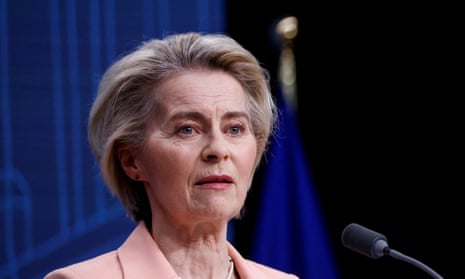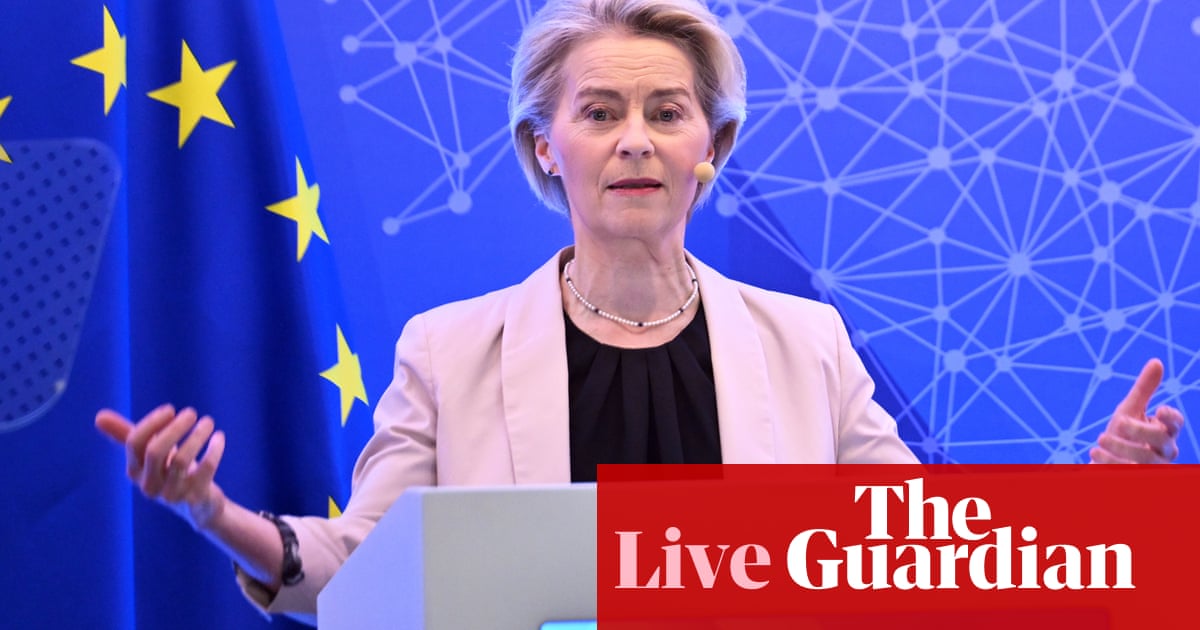‘We will protect our interests, however and whenever needed’ EU’s von der Leyen tells Trump
European Commission president Ursula von der Leyen has been speaking at the EU Ambassadors conference earlier today, and she could not escape the issue of Trump’s threats against the bloc.
Calling the relationship “the cornerstone of peace and prosperity” and stressing that “no other economies in the world are as integrated, in such an advanced way”, accounting for almost 30% of global trade, she said her focus was on “making it work.”
But since that may not be that easy under Trump, she seems to have a plan:
So, our first priority is now to work on the many areas where our interests converge. And there is still scope to do so much more – from critical supply chains to emerging technologies.
We will be ready for tough negotiations where needed and to find solutions where possible to work out any grievances and to set the foundations for a stronger partnership.
Still, in a rather robust comment at the end, as you do among closest friends, she asserted that there would be limits to the EU’s “open and pragmatic” approach.
We will make it equally clear that we will always protect our own interests – however and whenever that is needed. This will always be the European way.

Key events
Closing summary

Jakub Krupa
… and on that note, it’s a wrap from me, Jakub Krupa.
We continue our coverage of the developing situation in Sweden, where at least five people have been injured in an attack at an education campus, on our special live blog below.
Here are the three things to take away from today’s Europe Live blog:
-
Luxembourg’s foreign minister Xavier Bettel warned the EU against showing any weakness in trade talks with Donald Trump, warning: “If you are weak, he eats you. And if you don’t negotiate, he kills you.” Bettel, who worked with Trump during his first term as Luxembourg’s prime minister, insisted that Europe should be united and ready to retaliate, while reminding the US administration that “America first does not mean America alone” (9:58).
-
Hungarian prime minister Viktor Orbán said Trump’s return to global politics means Europeans can “say goodbye to world trade rules as we know them,” as he suggested he could play a role in negotiating with the US president given their close personal relations in the past (10:18).
-
France’s far-right National Rally party does not intend to back a no-confidence motion in François Bayrou’s government over a budget bill he is seeking to pass without a vote, its president, effectively confirming that the country’s prime minister François Bayrou will stay in post, as the opposition’s plans for a confidence vote do not have enough votes to pass (9:36).
And that’s all from me, Jakub Krupa, for today.
See you again tomorrow.
If you have any tips, comments or suggestions, email me at jakub.krupa@theguardian.com.
I am also on Bluesky at @jakubkrupa.bsky.social and on X at @jakubkrupa.
What’s next for student protests in Serbia? – analysis
Over the last two weeks, we have been closely covering student protests in Serbia.
The students’ strategy is to focus on the Novi Sad station disaster with specific demands for transparency and accountability, and their hope is their dogged insistence on those two scarce commodities will somehow change Serbia.
Over the weekends, tens of thousands took to the streets again.
But with student-led activists reluctant to engage politically against well-entrenched regime, many are asking: now what?
Julian Borger was in Novi Sad over the weekend and here is his report.
We need to talk, ‘Trump-whisperer’ Stoltenberg says
Former Nato chief Jens Stoltenberg, who became Norway’s new finance minister on Tuesday, said engaging with the Trump administration on trade was key to avoiding tariffs as Europe braces for a potential transatlantic trade war, Reuters reports.
The appointment of the widely respected veteran politician and diplomat at a time of global trade tensions could give Norway’s struggling Labour government a boost in opinion polls ahead of September’s parliamentary elections.
“My main advice is that one must spend time engaging with (the Americans), travel to (Washington) and speak with the administration, like we did with Nato,” Stoltenberg told reporters as he took up his post in the finance ministry.
“We are going to do everything we can to avoid tariffs being imposed on Norway.”
At Nato, Stoltenberg was dubbed the “Trump-whisperer” for convincing Donald Trump to stick with the alliance after the U.S. president complained during his first term that allies were spending too little on defence and threatened to pull out, Reuters notes.
Swedish school attack – live updates
For more updates from Sweden, you can tune into our live blog here:
Five people affected by the school attack: Swedish police
The latest update from the Swedish police talks about five people affected. We have no details on the extent of their injuries.
We will bring you the latest when we have it and it comes from confirmed sources.
Swedish police responding to an armed attack at a school
Swedish police said on Tuesday they are responding to an attack at a school in the city of Örebro, the sixth-largest city in the country, some 200 km from Stockholm.
The latest police update says four people have been affected, with no details on their injuries. The operation is still active, the note says.
‘We will protect our interests, however and whenever needed’ EU’s von der Leyen tells Trump
European Commission president Ursula von der Leyen has been speaking at the EU Ambassadors conference earlier today, and she could not escape the issue of Trump’s threats against the bloc.
Calling the relationship “the cornerstone of peace and prosperity” and stressing that “no other economies in the world are as integrated, in such an advanced way”, accounting for almost 30% of global trade, she said her focus was on “making it work.”
But since that may not be that easy under Trump, she seems to have a plan:
So, our first priority is now to work on the many areas where our interests converge. And there is still scope to do so much more – from critical supply chains to emerging technologies.
We will be ready for tough negotiations where needed and to find solutions where possible to work out any grievances and to set the foundations for a stronger partnership.
Still, in a rather robust comment at the end, as you do among closest friends, she asserted that there would be limits to the EU’s “open and pragmatic” approach.
We will make it equally clear that we will always protect our own interests – however and whenever that is needed. This will always be the European way.
German conservatives lose 2 points in new poll after siding with far-right on migration
Support for Germany’s conservative CDU/CSU bloc fell by two percentage points to 28% within a week, a survey published less than three weeks before federal elections showed on Tuesday.
The Forsa opinion poll for RTL/ntv-Trendbarometer also showed that support for the far-right Alternative für Deutschland, in the second place, was unchanged at 20%, with the Social Democrats (SPD) of chancellor Olaf Scholz third and steady at 16%.
The Greens and Die Linke, the Left, seem to be the beneficiaries, with both noting a slight 1 percentage points uptick in their support.
The poll comes just days after a very tumultuous week in German politics, which first saw the first ever non-binding motion passed with the votes of the far right, and then a follow-up draft law rejected after the idea of breaking the “firewall” arrangement again led to splits within the main conservative party.
We will update our tracker shortly here, but keep an eye on it as we get closed to 23 February!
Thousands leave Santorini as earthquakes continue for the third day
Thousands of people were leaving the Greek island of Santorini by sea and air for a third day Tuesday as an unprecedented series of earthquakes shook the top travel destination, AFP reports.
Some 6,000 people have already left the island, known for its spectacular cliff side views and a dormant volcano, which has been hit by hundreds of tremors since last week, officials said.
According to the Greek coastguard, over 4,600 people have left the island by ferry since Sunday.
The country’s leading air carrier Aegean Airlines said it had flown nearly 1,300 people out of Santorini on Monday, with another eight flights able to carry 1,400 passengers scheduled for Tuesday.
Another quake with a magnitude of 4.9 hit early on Tuesday morning amid other smaller tremors. No injuries or damage were reported on Santorini and the neighbouring islands of Anafi, Ios and Amorgos, which have also been affected by the seismic activity.
Schools on Santorini and the neighbouring islands of Anafi, Ios and Amorgos, have been shut as a precaution until Friday.
Norway rules out fish farm ban despite ‘existential threat’ to wild salmon

Miranda Bryant
Norway’s environment minister has ruled out a ban on open-net fish farming at sea despite acknowledging that the wild North Atlantic salmon is under “existential threat”.
With yearly exports of 1.2m tonnes, Norway is the largest producer of farmed salmon in the world. But its wild salmon population has fallen from more than a million in the early 1980s to about 500,000 today.
While the decimation of the wild population is in large part due to the climate crisis, the country’s salmon industry, which has had escapes of farmed fish and a significant rise in sea lice parasites, has helped reduce numbers to a historic low, resulting in the closure of 33 rivers to salmon fishing last summer.

Lisa O’Carroll
A Syrian refugee deported from Greece before his asylum application was processed is back in the European Court of Justice today.
He is appealing a ruling by the court that the European border protection agency, Frontex, did not break the law in a landmark case in 2023.
The Syrian man, his wife and four small children made the perilous journey via people-smugglers from war-torn Aleppo to Greece in 2016 but 11 days after making landfall they were flown to Turkey by Frontex.
The European court of justice dismissed his claim in 2023 that Frontex had breached the law noting the agency was not responsible for asylum processes nor did it have the power to assess the merits of applications for international protection.
His case was brought by the Amsterdam lawyers Prakken d’Oliveira and supported by the Dutch Council for Refugees who said the family had been a victim of and “illegal pushback” by the Greeks.
Central to the hearing in Luxembourg today is the question whether Frontex is accountable for fundamental rights violations during its joint operations with member states.
Former ECJ advocate general Eleanor Sharpston KC is part of the team presenting the case on behalf of the family.
Judgment is not expected for at least six months.
Former Nato sec gen Stoltenberg makes return to politics as Norway’s finance minister
Former Nato secretary general Jens Stoltenberg makes a return to national politics as he has accepted the post of finance minister as part of a cabinet reshuffle after last week’s collapse of the Labour Party’s coalition with the Eurosceptic Centre Party.
Norwegian media are reporting that he has taken an indefinite leave of absence from his other position as chair of the Munich Security Conference to take the new role.
Stoltenberg was previously prime minister of Norway in 2000-2001 and 2005-2013.
Obviously, the meeting between Frederiksen and Starmer comes on the back of the UK prime minister’s attendance at an EU leaders’ summit last night, the first such case since Brexit.
Speaking at the press conference afterwards, EU leaders outlined the next steps in the process that could lead to “resetting” the relationship, with an EU-UK summit confirmed for 19 May.
After dinner, the European Council president, António Costa, told reporters that “everyone was delighted to welcome Sir Keir Starmer … and to say clearly that the United Kingdom and the European Union are reliable and predictable partners”.
Costa said he expected the EU and UK to hold a summit in the UK on 19 May to build “the closest relationship it will be possible to build together”.
But a majority of member states are demanding the UK sign up to the EU’s demands on fishing rights and a youth mobility scheme as part of a broader package to reset the relationship, including security.
Here is Jennifer Rankin’s report with the latest from Brussels.
Denmark’s Frederiksen to meet Britain’s Starmer in London today
Danish prime minister Mette Frederiksen continues her tour of Europe to rally support for Denmark’s position on Greenland and she will be in London today to meet with Britain’s prime minister Keir Starmer.
A brief note by her office says the pair – who both attended the Brussels meeting of EU leaders last night – will discuss European security, with particular focus on the Baltic Sea and the Arctic; Russia; and Nato.
Say goodbye to world trade rules as we know them, Hungary’s Orbán warns EU
Hungarian prime minister Viktor Orbán, on the other hand, is clearly enjoying life under Trump and the effect the US president is having on the EU.
In a post after yesterday’s ‘leaders retreat’ in Brussels, he said that it was “a strange gathering” as “everyone in Brussels can see the Trump tornado coming, but most still think they can get away from it,” before adding: “They won’t.”
In 14 days, Donald Trump has already turned the world upside down with a few measures. … Everything that the bureaucrats in Brussels have tried to force down our throats in recent years is over.
He also says that “we can say goodbye to the rules of world trade as we know them.”
President Trump will stand up for American interests, even against Europe. The European Union faces difficult months ahead and the bureaucrats in Brussels are going to have a tough time.
Orbán seems to suggest that he is uniquely positions to negotiate a deal with Trump, unlike the EU bureaucracy, given their longstanding friendship. He visited Trump at Mar-a-Lago in July last year.
We need to make an agreement, a deal, to preserve our economic relations with the United States. And a really good deal can be made by those who not only know but also respect each other. We always knew that President Trump would return, so we were prepared. We are constantly negotiating and we will make a good deal with the new administration of the United States.
And what about the bureaucrats in Brussels? You’ve made your bed, now lie in it!
‘If you’re weak, he eats you,’ ex Luxembourgish PM’s advice on dealing with Trump
Luxembourg’s foreign minister Xavier Bettel wins the day in Warsaw with the most clear-eyed and entertaining explanation of Trump’s trade policy.
Bettel, who worked with Trump as his country’s prime minister during his first term, had this to say:
If you are weak, he eats you. And if you don’t negotiate, he kills you.
He is losing the appetite on Europe. This is how we should deal with him: be strong, but be united.
America first does not mean America alone, because America needs partners too.
Bettel added that the consequences of any trade war would also hit Maga voters at home with higher prices. “I thought that was not Trump’s goal,” he said.
Joking about the need to talk with the new US administration, he went on to say:
It is like a wedding. I was a mayor, I did a lot of weddings before being a prime minister, but I was also a lawyer, did a lot of divorces. The most important thing is to speak together, and when you have problems … to discuss, to be around the table.
In summary, he tried to hit an upbeat note…
I worked for years with him, with Donald, and we survived. And he survived it too. So I am convinced that we are all going to survive and have a strong economy. It is in no one’s interest trying to weaken someone.
And I told you, the best thing is that he is not hungry for Europe.
…but eventually said that if Trump moves against the EU, the bloc will have to retaliate:
Usually the cleverest is the one who gives up, but here is something where you would have to answer. If there are attacks, you have to defend.
National Rally unlikely to support no confidence vote against France’s PM Bayrou
France’s far-right National Rally party does not intend to back a no-confidence motion in François Bayrou’s government over a budget bill he is seeking to pass without a vote, its president said Tuesday.
Jordan Bardella, president of the National Rally (RN), said his party would take its final decision on Wednesday morning.
“The question is: Is it better to have a bad budget or no budget at all? We will decide tomorrow,” Bardella told CNews television.
“I think that in the period we are going through, the French people would not benefit from a new form of instability that would strongly impact the economy,” he said.
Bardella’s line echoes that of the Socialist Party, which said that as much as it disagrees with many of the proposed measures, after so many months of prolonged uncertainty a budget it is still better than no budget.
The declaration ultimately confirms that Bayrou is safe (for now).
Morning opening: Groundhog Day 2025

Jakub Krupa
What would you do if you were stuck in one place, and every day was exactly the same, and nothing that you did mattered?
EU trade ministers attending this morning’s informal meeting in Warsaw may well be asking themselves that question.
Originally it is a quote from the 1993 movie Groundhog Day about… you know what. You watched it, surely. Everyone has by now.
For EU leaders, it is also about the new challenge of figuring out who could be targeted by the US president Donald Trump’s trade policy next. Every. Single. Day.
European Commission president Ursula von der Leyen admitted last night that there were “clearly new challenges and growing uncertainties” with the US and waved a finger at Trump, saying the bloc would “respond firmly” if targeted “unfairly or arbitrarily” by the US.
Her principles for dealing with the US president were fairly simple: “be prepared… be very pragmatic, engage early, discuss and negotiate with necessary,” while focusing on reforming the bloc from within.
Well, good luck.
Overnight, Trump pulled back from imposing tariffs on Canada and Mexico (for now?) but followed through on his promises to target China, sparking instant retaliation from Beijing.
Fortunately, EU trade ministers are meeting in Warsaw today to predict the unpredictable, figure out where we go next and how the bloc can “be prepared” for Trump. They will sort it out, right?
As the Bloomberg journalist and author Javier Blas commented on Trump’s brinkmanship style of negotiating: “So, do we do this every 30 days for the next four years?”
PS. The actual Groundhog Day was on Sunday, and Punxsutawney Phil, the hedgehog, has seen his shadow and is predicting six more weeks of wintry weather.
That’s 1444 days, and 16 hours in human terms, until 20 January 2029. At least.
It’s Tuesday, 4 February 2025, and this is Europe live. It’s Jakub Krupa here.
Good morning.










